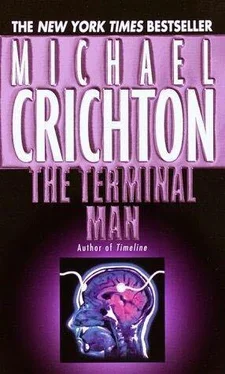Michael Crichton - The Terminal Man
Здесь есть возможность читать онлайн «Michael Crichton - The Terminal Man» весь текст электронной книги совершенно бесплатно (целиком полную версию без сокращений). В некоторых случаях можно слушать аудио, скачать через торрент в формате fb2 и присутствует краткое содержание. Жанр: Фантастика и фэнтези, на английском языке. Описание произведения, (предисловие) а так же отзывы посетителей доступны на портале библиотеки ЛибКат.
- Название:The Terminal Man
- Автор:
- Жанр:
- Год:неизвестен
- ISBN:нет данных
- Рейтинг книги:3 / 5. Голосов: 1
-
Избранное:Добавить в избранное
- Отзывы:
-
Ваша оценка:
- 60
- 1
- 2
- 3
- 4
- 5
The Terminal Man: краткое содержание, описание и аннотация
Предлагаем к чтению аннотацию, описание, краткое содержание или предисловие (зависит от того, что написал сам автор книги «The Terminal Man»). Если вы не нашли необходимую информацию о книге — напишите в комментариях, мы постараемся отыскать её.
The Terminal Man — читать онлайн бесплатно полную книгу (весь текст) целиком
Ниже представлен текст книги, разбитый по страницам. Система сохранения места последней прочитанной страницы, позволяет с удобством читать онлайн бесплатно книгу «The Terminal Man», без необходимости каждый раз заново искать на чём Вы остановились. Поставьте закладку, и сможете в любой момент перейти на страницу, на которой закончили чтение.
Интервал:
Закладка:
A good question, he thought. He stared at the TV image of the operation, then continued.
One might think of the computer in this case as a prosthetic device. Just as a man who has his arm amputated can receive a mechanical equivalent of the lost arm, so a brain-damaged man can receive a mechanical aid to overcome the effects of brain damage. This is a comfortable way to think about the operation. It makes the computer into a high-class wooden leg. Yet the implications go much further than that.
He paused to look at the screen. Somebody at the main tape station had changed reels. He was no longer seeing the operation, but a psychiatric interview with Benson before the surgery. Benson was excited, smoking a cigarette, making stabbing gestures with the lighted tip as he spoke.
Curious, McPherson turned the sound up slightly. "… know what they're doing. The machines are everywhere. They used to be the servants of man, but now they're taking over. Subtly, subtly taking over."
Ellis stuck his head into the office, saw the TV screen, and smiled. "Looking at the 'before' pictures?"
"Trying to get a little work done," McPherson said, and pointed to the dictation machine.
Ellis nodded, ducked out, closing the door behind him.
Benson was saying, "… know I'm a traitor to the human race, because I'm helping to make machines more intelligent. That's my job, programming artificial intelligence, and- "
McPherson turned the sound down until it was almost inaudible. Then he went back to his dictation.
In thinking about computer hardware, we distinguish between central and peripheral equipment. That is, the main computer is considered central even though, in human terms, it may be located in some out-of-the-way place - like the basement of a building, for example. The computer's read-out equipment, display consoles, and so on, are peripheral. They are located at the edges of the computer system, on different floors of the building.
He looked at the TV screen. Benson was particularly excited. He turned up the sound and heard, "… getting more intelligent. First steam engines, then automobiles, and airplanes, then adding machines. Now computers, feedback loops- "
McPherson turned the sound off.
For the human brain, the analogy is a central brain and peripheral terminals, such as mouth, arms, and legs. They carry out the instructions - the output - of the brain. By and large, we judge the workings of the brain by the activity of these peripheral functions. We notice what a person says, and how he acts, and from that deduce how his brain works. This idea is familiar to everyone.
He looked at Benson on the TV screen. What would Benson say? Would he agree or disagree? But then did it matter?
Now, however, in this operation we have created a man with not one brain but two. He has his biological brain, which is damaged, and he has a new computer brain, which is designed to correct the damage. This new brain is intended to control the biological brain. Therefore a new situation arises. The patient's biological brain is the peripheral terminal - the only peripheral terminal - for the new computer. In one area, the new computer brain has total control. And therefore the patient's biological brain, and indeed his whole body, has become a terminal for the new computer. We have created a man who is one single, large, complex computer terminal. The patient is a read-out device for the new computer, and he is as helpless to control the read-out as a TV screen is helpless to control the information presented on it.
Perhaps that was a bit strong, he thought. He pressed the button and said, "Harriet, type that last paragraph but I want to look at it, okay? Roman numeral four. Summary and Conclusions."
IV. Summary and Conclusions.
He paused again, and turned up the sound on Benson. Benson was saying, "… hate them, particularly the prostitutes. Airplane mechanics, dancers, translators, gas-station attendants, the people who are machines, or who service machines. The prostitutes. I hate them all."
As he spoke, Benson continued to stab with his cigarette.
"And how did you feel?" Dr. Ramos said.
"Angry," Janet Ross said. "Angry as hell. I mean, that nurse was standing there, watching it all. She pretended she didn't understand what was happening, but she did."
"You felt angry about…" Dr. Ramos let his voice trail off.
"About the operation. About Benson. They went ahead and did it. I told them from the beginning - from the goddamned very beginning - that it was a bad idea, but Ellis and Morris and McPherson all wanted to do it. They're so cocky. Particularly Morris. When I saw him in the recovery room, gloating over Benson - who was all taped up and pale as a ghost - I just got mad."
"Why is that?"
"Because he was so pale, because he, uh- "
She stopped. She fumbled for an answer, but couldn't think of a logical response.
"I gather the operation was successful," Dr. Ramos said.
"And most people are pale after surgery. What got you mad?"
She said nothing. Finally, she said, "I don't know."
She heard Dr. Ramos shift in his chair. She could not see him; she was lying on the couch, and Dr. Ramos was behind her head. There was a long silence while she stared at the ceiling and tried to think what to say. Her thoughts seemed to be churning, not making any sense. Finally Dr. Ramos said,
"The presence of the nurse seems important to you."
"It does?"
"Well, you mentioned it."
"I wasn't aware I had."
"You said the nurse was there and knew what was going on.
… What, exactly, was going on?"
"I was mad."
"But you don't know why?…"
"Yes, I do," she said. "It was Morris. He's so cocky."
"Cocky," Dr. Ramos repeated.
"Overly self-assured."
"You said cocky."
"Look, I didn't mean anything by that; it was just a word-
" She broke off. She was very angry. She could hear it in her voice.
"You are angry now," Dr. Ramos said.
"Very."
"Why?"
After a long pause, she sad, "They didn't listen to me."
"Who didn't listen to you?"
"Any of them. Not McPherson, not Ellis, not Morris. Nobody listened to me."
"Did you tell Dr. Ellis or Dr. McPherson you were angry?"
"No."
"But you vented your anger on Dr. Morris."
"Yes." He was leading her someplace and she couldn't see where. Normally at this point she could jump ahead and understand. But this time-
"How old is Dr. Morris?"
"I don't know. About my age. Thirty, thirtyone - something in there."
"About your age."
That pissed her off, his way of repeating things. "Yes, God damn it, about my age."
"And a surgeon."
"Yes…"
"Is it easier to express anger toward someone you regard as a contemporary?"
"I never thought about it."
"Your father was also a surgeon, but he wasn't your contemporary."
"You don't have to draw me a picture," she said.
"You're still angry."
She sighed. "Let's change the subject."
"All right," he said, in that easy voice that she sometimes liked, and sometimes hated.
Morris hated to do Initial Interviews. The Initial Interview staff consisted mostly of clinical psychologists; the work was lengthy and boring. A recent tabulation had shown that only one in forty new patients to the NPS received further work; and only one in eighty-three was accepted as having some variety of organic brain disease with behavioral manifestations. That meant most Initial Interviews were a waste of time.
And it was particularly true of off-the-street patients. A year ago McPherson had decided, for political reasons, that anyone who heard of the NPS and presented himself directly would be seen. Most patients were still referrals, of course, but McPherson felt the image of the Unit depended upon prompt treatment of self-referrals as well.
Читать дальшеИнтервал:
Закладка:
Похожие книги на «The Terminal Man»
Представляем Вашему вниманию похожие книги на «The Terminal Man» списком для выбора. Мы отобрали схожую по названию и смыслу литературу в надежде предоставить читателям больше вариантов отыскать новые, интересные, ещё непрочитанные произведения.
Обсуждение, отзывы о книге «The Terminal Man» и просто собственные мнения читателей. Оставьте ваши комментарии, напишите, что Вы думаете о произведении, его смысле или главных героях. Укажите что конкретно понравилось, а что нет, и почему Вы так считаете.









